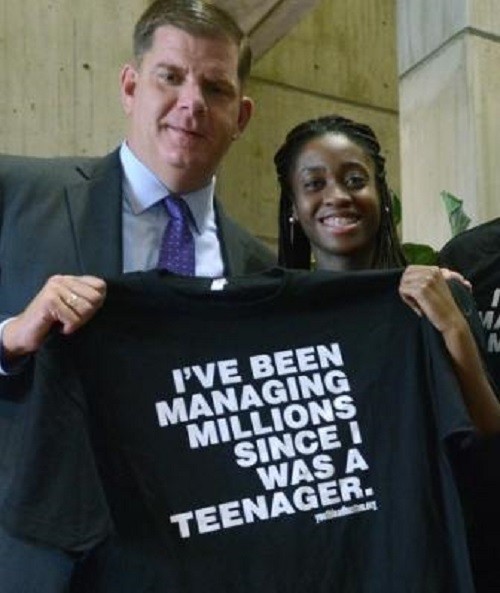
Youth Lead the Change (YLC): Participatory Budgeting Boston
Description
Youth Lead the Change (YLC) gives young people power over one million dollars of Boston City’s capital budget. The YLC process is informed by the Participatory Budgeting Process.
The project is youth led by teenagers from across the city of Boston and supported by trained youth facilitators. Goals include increasing youth power; allowing all voices to be heard; building stronger, safer, and healthier communities; and strengthening residents’ sense of pride, solidarity and equality throughout the city.
Examples of winning projects from 2019/20 proposals include: replacing school heating systems for a more productive learning environment; enhancing a shelter and creating comfortable spaces for those experiencing homelessness; and planting trees and plants along main streets and sidewalks to tackle climate change. Previous winning projects included: solar panels on city owned property; youth wi-fi lounge in Boston City Hall; performing and visual arts studio; water bottle refill stations; playground upgrades and art walls.
Preparation
Youth ‘change agents’ volunteer to develop ideas for capital projects which seek to make the city a better place for young people. They are tasked with developing proposals and budgets which they vote on annually.
The youth ‘change agents’ receive training and support and work with city staff through thematic committees to translate ideas into feasible projects. On average they dedicate 8-10 hours per month meeting after school over a 4-month period for proposal development. The process is facilitated by trained youth workers.
Implementation
Youth Lead the Change Process draws on 5 Steps.
Step 1: Writing the Rules
The previous year’s guidelines are reviewed, and the process is updated as required. A timeline and workplan for each stage of the process is developed. A steering group which is representative of the community including members from underserved areas is assembled. Decision-making roles are communicated to the steering committee and public.
Step 2: Idea Collection
Ideas for community improvements are collected from residents. Ideas must meet 3 qualifying criteria: include improvements to physical city of Boston property including parks, schools, libraries and community centres; benefit the public; last at least 5 years.
Social Media, text messages, personal social networks of the Mayor’s Youth Council, events and mass advertising are used to collect ideas.
Step 3: Develop Proposals
Volunteer ‘change agents’ develop project proposal ideas with young people and City departments which are then voted on by the community.
Step 4: Community Voting
Community members aged 12-22 years have one vote. Change agents tally and announce the top three winning projects.
Step 5: Fund Winning Projects
Youth, City Departments and stakeholders work together to put winning projects in place.
New Urban Mechanics and Youth Engagement and Employment support the process.
Ways of engaging young people
Young people are involved at every stage from pre-planning, idea collection, proposal development, voting and evaluation and monitoring implementation of the projects.
Trained youth facilitators guide the process.
Role of young people
- Participants
- Beneficiaries
- Helpers
- Organizers
- Managers to deliver the process
Positive aspects of the project/process
Young people are at the centre of the process.
Language translation and interpretation provided to maximise participation.
Additional outreach efforts targeted at young people who face barriers to participating.
Trained Youth Facilitators guide the process.
Strong engagement from Boston Public Schools community.
Main obstacles to the project/process
Young people noted that access to transport was a challenge limiting their participation as meetings which were generally held in the City Hall (downtown) rather than in the surroundings neighbourhoods.
Recommendations for improvements include better communications throughout; additional efforts to engage young men and those who are not involved in city programming or related youth programmes.
Opinion after implementation
Participants are surveyed (interviews, focus groups and observations) at the end of each cycle by a team of researchers from Boston University. Benefits expressed included: increased civic awareness; skill building; motivation to get involved; empowerment of young people and greater knowledge of the city and government.
Accountability of resources
City of Boston Oversight Committee oversees the whole project.
A Steering Committee oversees the PB process and implementation of projects along with change agents.
City Departments provide feedback on project ideas and their development into workable proposals regarding eligibility and cost.
Participatory Budgeting Project (PBP) provide technical assistance.
1-3 tips (advices, warnings) from organizers or participants
- - Provide training and technical PB support – including support to develop and write proposals.
- - Provide a calendar at the start of the process that maps out meeting times and locations – and provide reminders/alerts.
- - Be clear on the role of ‘change agents’ and time commitments.
- - Acknowledge and reward participation – Recognition ceremony, certificates.